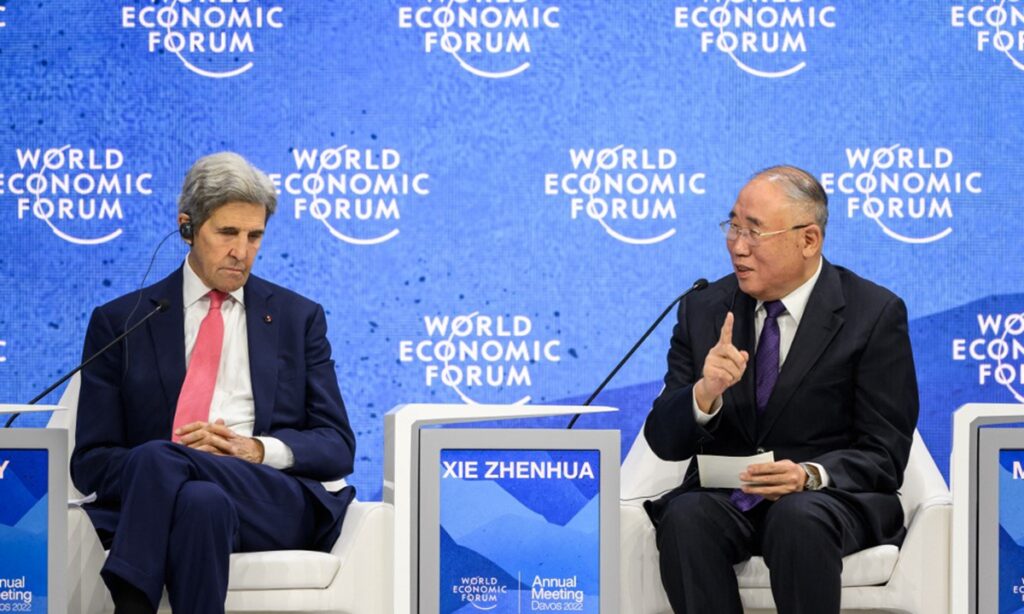Top climate officials from China and the US started talks after the leaders of both countries endorsed the resumption of communications on climate change, which scientists believe is expected to push the ongoing COP27 summit to be a venue for concrete results and may also point to a possible bilateral consensus at the summit.
US climate envoy John Kerry and China’s top climate official Xie Zhenhua met for about 45 minutes at the Chinese delegation’s offices in the COP27 conference zone, the Associated Press reported.
It quoted Kerry as saying “We had a very good meeting.” It was “much too early” to talk about any remaining differences, he said. “But we’re gonna go to work.”
The meeting came shortly after the meeting between Chinese President Xi Jinping and his US counterpart Joe Biden on Monday. The two presidents agreed that the two countries will jointly work for the success of COP27.
The two countries’ communication on climate change was suspended after US House Speaker Nancy Pelosi’s highly provocative visit to the island of Taiwan in August.
The two leaders’ meeting in Indonesia has assuaged conflicts at COP27, Li Shuo, a senior global policy adviser at Greenpeace China who is attending the summit, told the Global Times. Usually, a consensus on climate between China and the US, the two biggest emitters, can directly push forward multilateral progress during climate summits.
“Now that China and the US have resumed talks on climate change, it can also help push COP27 to reach a concrete result,” said Li.
Scientists are also optimistic that it is possible that reopening communication will translate into concrete agreements between Beijing and Washington at COP27, which is scheduled to end on November 18.
“I believe the two will reach a certain degree of consensus at the meeting,” Guan Dabo, a professor from the Department of Earth System Science at Tsinghua University, who is also attending the summit, told the Global Times. According to his knowledge, negotiations between the two countries are focused on cutting emissions and fulfilling rich countries’ promise to provide $100 billion a year to the developing world for cutting emissions and adapting to the changing climate.
Last year, before COP26 convened in Glasgow, China and the US issued a joint announcement in November, vowed to intensify their efforts on tackling global warming.
However, the two are at loggerheads about some issues at this year’s COP27 summit. The single largest issue facing negotiators in Egypt is whether to create a fund to help poor countries cope with the loss and damage from continuing climate disasters. The agenda item was proposed by Pakistan on behalf of the Group of 77 and China, yet the US appears to be the most visible blocker of such a mechanism.
Speaking at a sideline event last week, Xie said that Beijing is prepared to spend money to help poorer countries. “It is not China’s responsibility, but we are willing to help,” said Xie, while urging rich countries to pay the promised money.
Despite hailing the progress in China-US cooperation on the climate as “shining point” at COP27, experts cast doubts on the stability and consistency of US promises on climate change.
The possibility of a return of a Republican president makes it hard for the US to make more promises on climate change, and it overshadows the stability of China’s cooperation with the US on the issue in the long run, said Guan.
Although Republicans’ gains in the US midterms are unlikely to knock Biden’s existing climate policies off course, experts still worry that the filibuster may undermine Washington’s future climate efforts. Former president Donald Trump on Tuesday launched a bid to regain the presidency in 2024, and it was during his administration that the US pulled out of the Paris Agreement in 2017.
“The US instability on climate issues leaves room for China to play a larger role in leading climate issues globally, especially among developing countries,” said Guan.
The reason why climate change was among the first areas where China and the US resumed communications is because it is a less political issue between the two, Li Haidong, a professor at the Institute of International Relations at the China Foreign Affairs University, told the Global Times.
Since the two restarted such communications, it is important that Washington stop weaponizing the issue, such as imposing sanctions on Xinjiang region’s photovoltaic industry.
“The influence of domestic policy, plus the US tendency of using climate change as a weapon to crack down on China, makes Washington the obstacle for bilateral cooperation,” said Li.
(Global Times)




